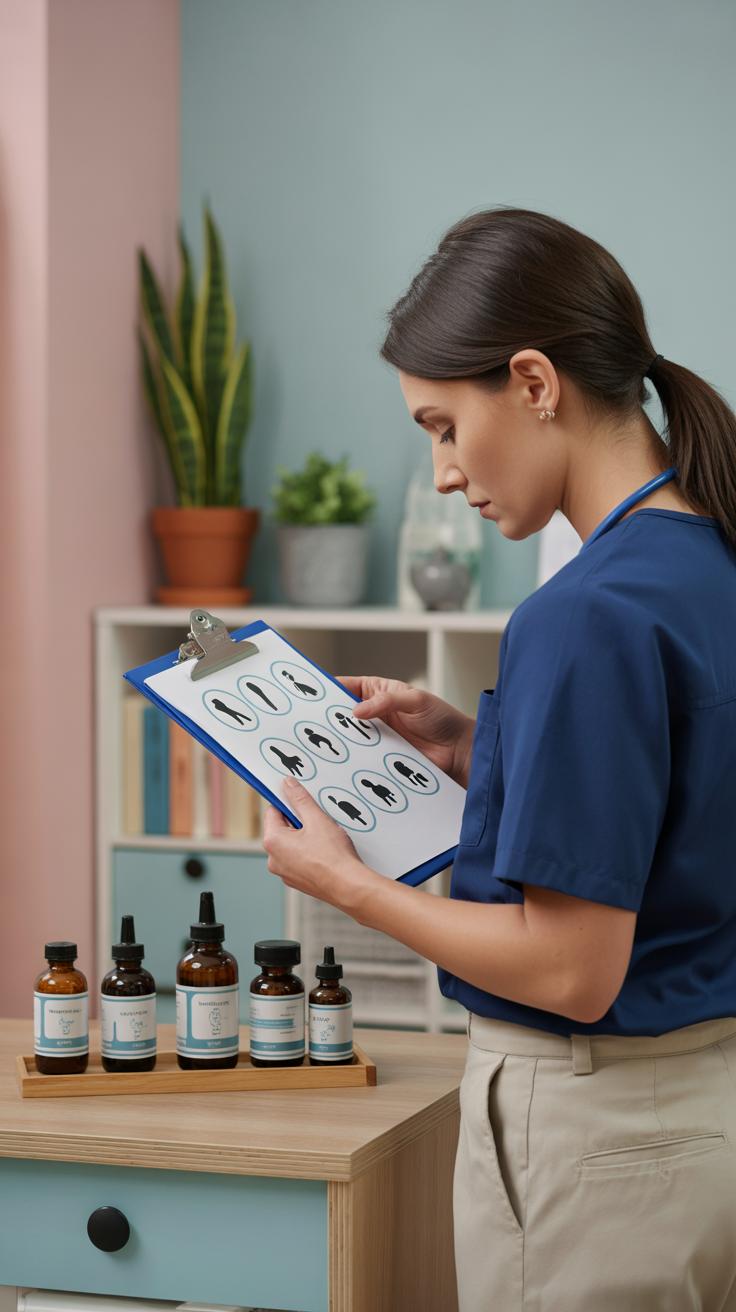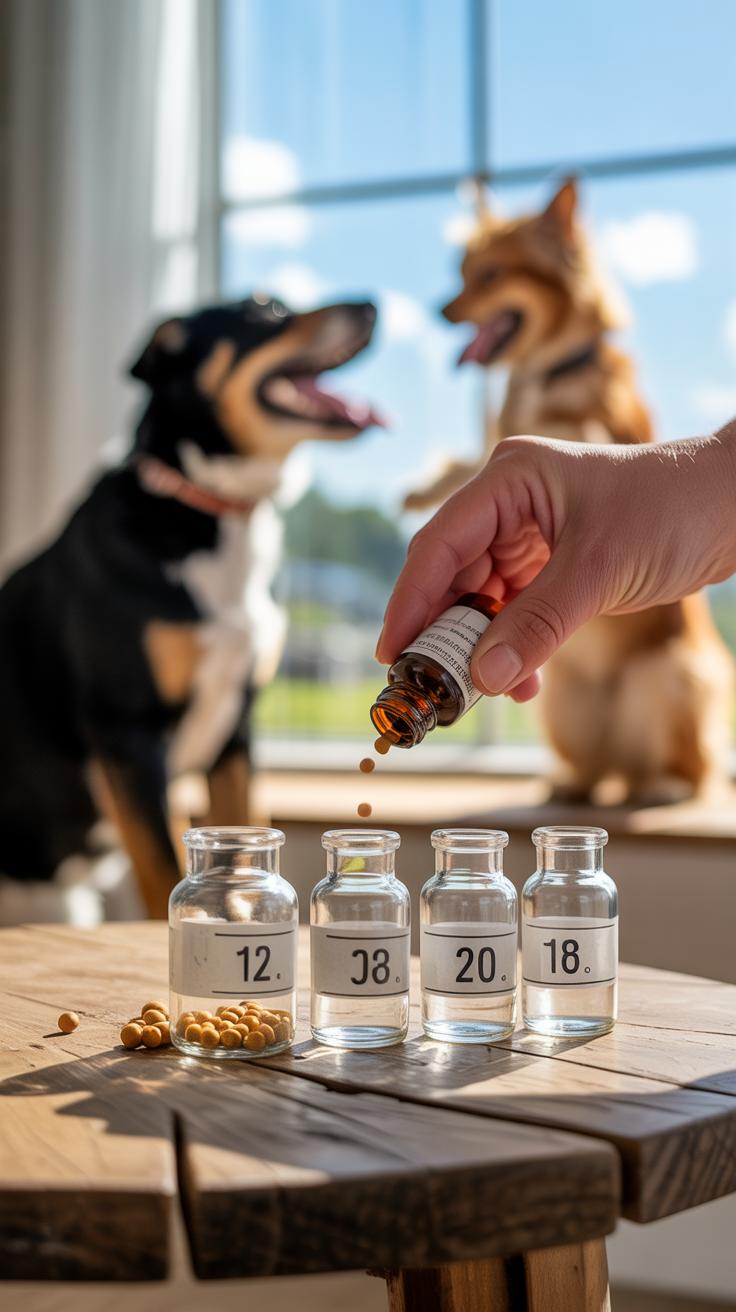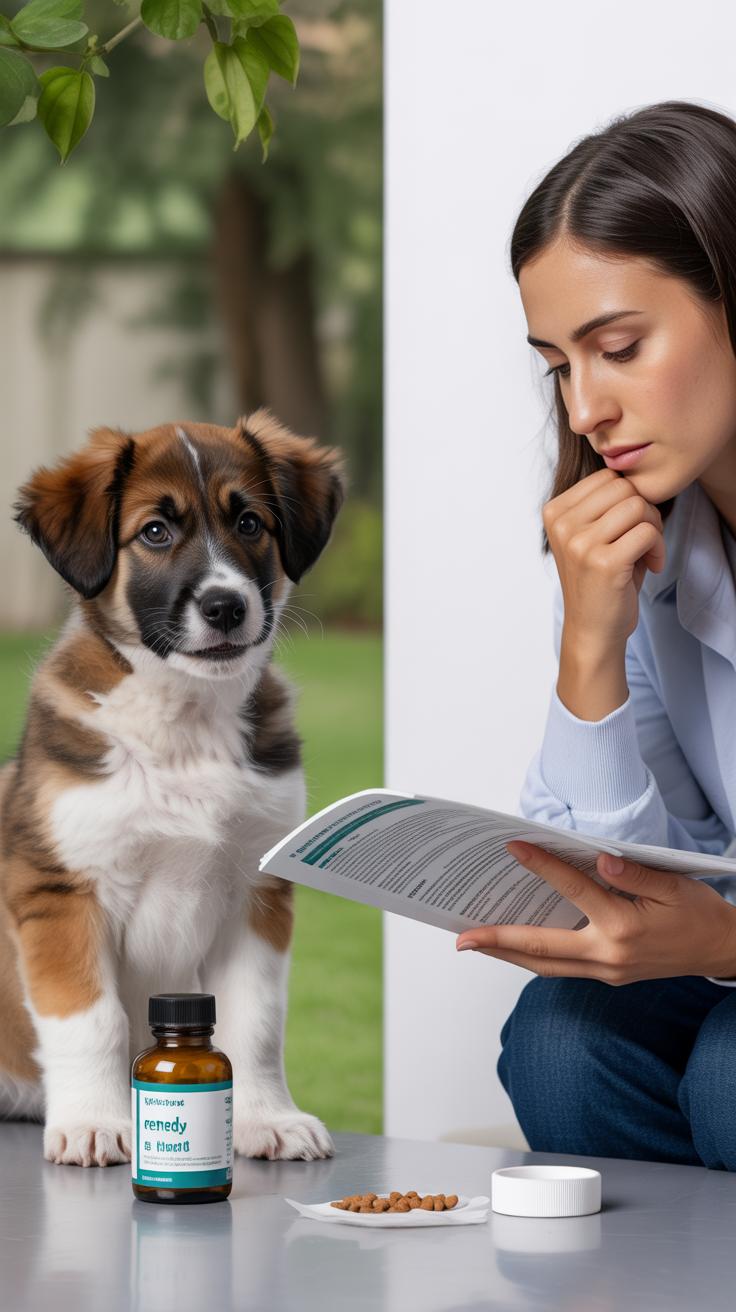Introduction
Homeopathy is an alternative approach to treating health issues that uses natural substances to help the body heal itself. Many pet owners look for gentle ways to support their pets’ health without harsh chemicals or medicines. Homeopathy offers options that might fit this need by focusing on the whole well-being of your pet.
This article explores how homeopathy can be used to approach common pet ailments. You will learn about the principles behind homeopathy, specific conditions it may address, and important considerations when choosing this method for your pet’s care. Let’s dive into how homeopathy might be part of your approach to your pet’s health.
Basics of Homeopathy and How It Works
What is Homeopathy
Homeopathy is a kind of gentle medicine that helps the body heal itself. It started a long time ago, over 200 years back, thanks to a doctor named Samuel Hahnemann. He had this idea that small doses of something that can cause symptoms might also help fix those symptoms when given correctly. This idea is called “like cures like.” It’s a little like when a tiny bit of something makes you feel what you’re already feeling, but in a helpful way.
Unlike regular medicine, homeopathy doesn’t try to fight the illness directly. Instead, it nudges the body to do its own healing, almost like waking up your pet’s natural defense system. It’s a different way of thinking about health. Maybe it works slowly. Sometimes it can feel a bit mysterious, but that’s the basic thought behind it.
How Homeopathic Remedies Are Made
Making homeopathic remedies sounds unusual. They start with a substance that might cause symptoms if you eat or touch a lot of it. Then, this substance is mixed with water or alcohol and shaken hard—this step is called “potentization.” After shaking, it’s diluted, which means it’s mixed over and over again until very little or none of the original substance is left.
Why do this? The idea is that shaking and diluting helps the remedy keep a “memory” of the original substance. It kind of resets or encourages the body’s healing, without any strong chemical effect. It might sound strange that less can be more, but that’s how homeopathy works. The soft shaking, called succussion, is as important as dilution. It’s like releasing the hidden power in the water.
Some people find this hard to believe at first. I did too. Yet, many pet owners find these remedies helpful for small problems and want to try something natural before stronger medicines. So, homeopathy offers a different way to look at healing, one that trusts the body a bit more.
Common Pet Ailments Treated with Homeopathy
When your pet shows signs of discomfort, you might wonder whether homeopathy could help. Many pet owners turn to homeopathic remedies for issues that come up fairly often, like skin conditions, digestive troubles, or anxiety. These aren’t just little annoyances; they can affect your pet’s overall happiness and energy.
Skin Conditions
Pets often get itchy or develop rashes that don’t always clear up quickly. Homeopathy might offer gentle support here. For instance, if your dog scratches constantly or has red patches, remedies like *Apis mellifica* or *Rhus toxicodendron* are sometimes chosen. These are thought to help reduce itching and inflammation without the side effects some creams might cause.
It’s interesting – some owners notice changes within days, while others feel it takes longer, depending on the pet and the exact problem. You might find yourself wondering if a different remedy or a combination is better. It’s not a one-size-fits-all, really.
Digestive Problems
Digestive upsets like vomiting or diarrhea are another common concern. Homeopathy looks at these issues a bit differently. Instead of just stopping the symptom, remedies such as *Nux vomica* or *Arsenicum album* are used to gently encourage the body to heal itself.
For example, if your cat vomits often after eating something new, a homeopathic approach might help reset the system. Still, timing and accuracy matter. Sometimes the symptoms improve slowly, which can test your patience. You may notice some pets respond better to one remedy over another, or need adjustments over time.
So, when your pet struggles with these common troubles, homeopathy can be worth considering. It doesn’t promise instant fixes, but it offers an alternative that’s often quite mild and focused on your pet’s natural healing process.
How to Identify When to Use Homeopathy
Recognizing Signs in Your Pet
Not every sniffle or scratch calls for a homeopathic remedy, but small changes in your pet’s usual behavior might hint at when it could help. Look out for subtle shifts—maybe your dog or cat starts licking a spot more often, or seems unusually restless or withdrawn. These signs often surface with minor skin irritations, mild digestive discomfort, or low-level anxiety that doesn’t improve over a few days. Sometimes pets show vague symptoms like reduced appetite or sluggishness that don’t quite fit a clear illness, and that’s where gentle homeopathic support might be worth exploring.
Keep a simple journal of these behaviors—times, triggers, and patterns can offer clues. Ask yourself: Is this a temporary hiccup or a persistent issue? Do symptoms flare up in certain situations, or remain constant? If these signs linger but aren’t severe, homeopathy might provide relief without overwhelming their system.
Knowing When to Consult a Veterinarian
It’s easy to want a natural fix, but some conditions require immediate veterinary attention. High fever, vomiting, diarrhea lasting more than a day, labored breathing, sudden lameness, or severe injury are clear reasons to go straight to a vet. Even if you’re trying homeopathy, don’t hesitate to involve a professional when symptoms worsen or if you notice confusion, seizures, or severe pain—it’s not a substitute for emergency care.
Think of homeopathy as a complement, rather than a replacement, for conventional treatment. Sometimes, pets need diagnostics or medications before gentle remedies can help. So if in doubt, a vet’s insight is your best guide, especially with young, elderly, or chronically ill pets. Trust your instincts, but don’t let hesitation delay expert help when it counts most.
Steps to Start Homeopathic Treatment for Your Pet
Finding a Qualified Homeopathic Veterinarian
Starting homeopathic treatment means first finding a vet who truly understands it. This can feel tricky since not every vet offers homeopathy or has the right training. You want someone who’s studied animal homeopathy specifically, not just general practice with a casual interest.
Look for vets connected to professional homeopathy organizations or those with certifications in veterinary homeopathy. Ask around—pet communities or forums often share recommendations. But keep in mind, experience matters as much as credentials. Don’t hesitate to call the clinic and ask how long they’ve been working with homeopathic remedies. It’s okay to be picky here—you’re trusting this person with your pet’s care.
Making Your Pet Comfortable During Treatment
Administering remedies doesn’t need to be complicated, yet it can feel a bit awkward at first. Homeopathic pellets usually go on the tongue or mixed with a little water. You might find your pet resists at first, which is normal. Try to keep the experience calm and consistent. Give remedies in a quiet space, maybe after a walk or cuddle session.
Observe your pet’s reactions closely. Sometimes they change behavior slightly, or symptoms improve slowly—you want to catch subtle signs. Patience helps. Comforting your pet with extra attention and gentle touch during this time can make a big difference, especially since these treatments aim to support natural healing rather than force quick fixes.
Benefits and Limits of Homeopathy for Pets
Homeopathy is often seen by pet owners as a gentle approach to managing common ailments like allergies, digestive upsets, or mild skin irritations. Some find that it supports their pets’ overall well-being without the side effects that sometimes come with conventional medications. While there’s no strong scientific evidence proving homeopathy’s effectiveness, many report subtle improvements in their pets’ energy levels or moods after treatment. That said, expecting it to solve serious health problems might lead to disappointment.
Pet owners appreciate these possible advantages:
- Minimal risk of side effects compared to conventional drugs
- A personalized approach that considers the pet’s unique symptoms and temperament
- Ease of administration, often given as small pellets or drops
- Support for chronic issues where conventional treatment might be limited or harsh
- Encouragement to tune in closely to a pet’s subtle changes
Still, homeopathy isn’t a cure-all. It doesn’t replace vaccinations, antibiotics for infections, or emergency care. It can be slow-acting and subtle, which makes it tricky to measure success clearly. So you need to keep expectations in check and use it as one tool among others, not the only treatment. Sometimes, people invest hope in homeopathy in ways that might delay more effective care, which can be risky. Finding a balanced view—appreciating potential benefits while recognizing limits—probably serves both your pet and peace of mind best.
Integrating Homeopathy with Conventional Veterinary Care
Using homeopathy alongside traditional veterinary treatments can offer a broader approach to your pet’s health. Many pet owners find that combining methods may help address both symptoms and overall wellbeing. It’s not about choosing one or the other, but rather about finding balance.
Working with your vet is key. They can help you decide when homeopathic remedies might complement prescribed medicines or treatments. For example, if your dog is on medication for arthritis, a homeopath’s gentle remedies might support comfort without interfering. But you’ll want your vet to weigh in, especially when conditions are serious.
Watching how your pet responds is equally vital. If you notice improvements, great. But if symptoms linger or worsen, it’s a signal to adjust the approach. Sometimes shifting doses or trying different remedies makes sense. It’s a process that might feel slow at times—and that’s okay.
What works for one pet might not for another. So, keeping clear communication with your vet about any homeopathic treatments ensures everyone’s on the same page. This collaboration can give your furry friend the best chance at steady, steady progress.
Safety Tips and Precautions with Homeopathy
Safety Tips for Using Homeopathy with Pets
When you start using homeopathic remedies for your pet, it’s best to avoid self-diagnosis. It’s tempting to pick a remedy yourself, especially if you’ve read about it online, but pets can’t tell you exactly what’s wrong. A professional’s input helps prevent errors that might delay proper treatment.
Also, keep a close watch for any side effects. Although homeopathic remedies are generally mild, animals may still react unexpectedly. If your pet seems more restless, lethargic, or shows new symptoms, pause the treatment and consult a vet.
Avoiding Common Mistakes When Administering Remedies
Here are some pitfalls to watch out for:
- Giving the wrong potency or dosage—this can lessen effectiveness or cause reactions.
- Mixing remedies without guidance—some don’t mix well, which might confuse your pet’s system.
- Ignoring diet and environment; homeopathy works best alongside good overall care.
- Stopping treatment immediately after slight changes—sometimes subtle shifts need time.
- Using remedies past their expiration or storing them near strong odors or electronics, which might reduce potency.
Watching for Changes and Knowing When to Act
Tracking your pet’s health closely is key. You might see improvements like better energy, less scratching, or calmer behavior. Great signs to note!
On the flip side, sometimes symptoms can worsen temporarily before getting better. That’s tricky, and can confuse any pet owner. If these changes last too long or your pet seems distressed, it’s time to revisit your vet or the homeopathic practitioner.
Remember: your observations are crucial. Ask yourself—are these changes consistent, or do they come and go? When in doubt, don’t hesitate to seek professional advice. Better safe than sorry.
Real Stories from Pet Owners Using Homeopathy
Success Stories
Many pet owners have tried homeopathy with some encouraging results. For instance, one dog owner shared how their anxious Labrador calmed down noticeably after a few weeks of gentle homeopathic remedies. The change wasn’t immediate, but the gradual improvement spoke to the owner’s patience and consistency. Another case involved a cat with recurring skin irritations. Instead of relying solely on topical treatments, the owner combined homeopathic drops with natural dietary adjustments. Over time, the flare-ups became less frequent, and the cat seemed more comfortable.
These examples don’t guarantee the same for everyone, but they highlight how some pets respond well when homeopathy is part of a broader care plan. Sometimes, just avoiding synthetic chemicals made a positive difference. It’s about observing your pet closely and adjusting as you go.
Learning from Challenges
Not every story ends on a high note. I’ve heard from pet owners who felt frustrated when homeopathy didn’t seem to help much. For example, one owner of a senior rabbit with arthritis tried several remedies but saw no change, eventually turning back to conventional veterinary treatments. They realized homeopathy might not replace all medical needs, especially when conditions become more serious or complex.
Some also noted that homeopathy requires patience—immediate results aren’t common and sometimes it’s hard to tell if improvements are due to the remedies or other factors. This uncertainty made some hesitant to continue. It raises the question: how do you balance hope with realistic expectations when trying alternative methods?
These experiences underline that homeopathy can be part of your approach, but it’s rarely a magic fix. Listening to your pet and staying adaptable often brings the best outcomes.
Conclusions
Homeopathy presents a unique way to support your pet’s health by using natural remedies tailored to individual symptoms. While it may not replace traditional veterinary care for serious conditions, it can offer alternative options that some pet owners find helpful.
Understanding the basics of homeopathy and how it applies to common pet ailments can help you make informed choices. Your pet’s well-being is a priority, and exploring various safe and gentle approaches, including homeopathy, might contribute to better health outcomes.





















